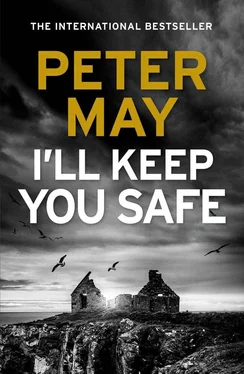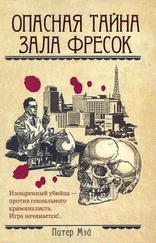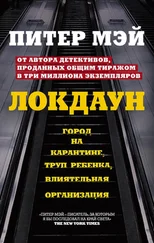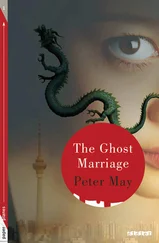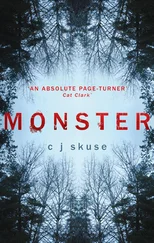His face was flushed pink by the wind, and there was a light in his eyes. ‘A man called Richard Faulkner lives down there. That’s who we’re going to see.’
‘Why?’
He ignored my exasperation. ‘He retired here nearly twenty years ago, from what by all accounts was a very successful business in the south of England. He taught himself to weave and established a one-man business that he called Ranish Tweed. It’s not Harris Tweed. It’s lighter, and softer. He uses lamb’s wool, and cashmere, and other gentler yarns. But it looks like Harris Tweed, and feeds off its reputation.’
I shrugged and had no idea where this was going. ‘Never heard of it.’
Ruairidh smiled. ‘Most people haven’t. At least, not on the island. But it’s achieved a considerable cachet among some of the top tailors in Savile Row. Apparently there is a constant stream of them coming up from London to talk patterns and design with Faulkner, and to place orders in person. And Ranish jackets, it seems, have found favour with the Royals. Which in turn has made them popular with their hangers-on. Who, as you know, are only too keen to ape their superiors.’ A sardonic smile reflected his well-worn republican sentiments. ‘Not,’ he added quickly, ‘that I would hold that against them if it meant I could sell them a few.’
I frowned. ‘Why would you be selling jackets to the Royals, or anyone else for that matter?’
‘Well, if I were the proprietor of Ranish Tweed, I’d want to sell as much of it as I possibly could.’
I wish I could have seen my own face, because it certainly made him laugh. He rounded the car and took me in his arms, brushing the hair from my eyes.
‘Oh, Niamh. Ranish could be ours. Faulkner’s selling. The business and the brand. He’s in his seventies now, and arthritis means he’s not going to be able to work the loom for much longer. But he won’t sell to just anyone.’
‘But Ruairidh...’ I shook my head. ‘Neither of us weaves.’
‘No, but I could learn. And my dad weaves. And yours. My mum used to work as an assistant to the designer at the Carloway Mill.’ He grinned. ‘And, Niamh, you were the best sales and marketing person Johnstons of Elgin ever had.’
Which made me laugh. ‘I think Johnstons might take issue with that.’ But his enthusiasm was infectious, and I felt the first stirrings of excitement. It would be a dream, Ruairidh and I working together. Owning our own company. Weaving our own fabric, a cloth worn by kings and courtesans. ‘Could we afford it?’
‘My redundancy’ll be enough to buy the business. But we’ll have to persuade him that we’re the ones to sell it to.’ He paused to kiss me, holding my face between his palms. Then he looked at me, exultant I thought, and said, ‘And you might just be our secret weapon.’
We heard the loom at work as we climbed down uneven steps to the shed at the back of the house. I knew it was a Hattersley straight away. I had grown up with its distinctive music ringing in my ears. It was the soundtrack of my childhood, and for a time it had all but disappeared as the bottom fell out of the Harris Tweed market, and the famous cloth became almost extinct. On the other side of the island there was new investment now in old mills, and the tweed was about to be reborn. But the old Hattersley looms, which had been weaving cloth on the islands for more than a century, were being replaced by the new, improved, double-width Griffiths machines. Though to me their music was second-rate rap compared with the new romantics of my youth, and I was pleased to know that Ranish was still being woven on a Hattersley.
Old man Faulkner looked up from his machine as we walked in. His collie dog, curled up in a basket by the door, was on his feet in an instant barking at the strange smells the newcomers had brought with them.
‘Wheesht, Tam,’ the old man admonished, and Tam immediately averted his eyes and reluctantly settled back on to his blanket.
Faulkner’s feet slowed to a halt on the treadles and the wooden shuttle ceased its endless passage back and forth. In the silence that followed you could hear the wind whistling among the rafters. Rafters hung with rope and yarn and lengths of cloth, the wall behind him draped with yet more yarn in multifarious colours. An old bicycle was suspended from metal pegs hammered between the stones, and tools and oil cans and tins of cleaning fluid lay scattered across a wooden workbench among piles of pattern sheets coded in a clumsy scrawl that no one but Faulkner himself would ever be able to read. The floor was laid with flagstones, and I could feel the cold seeping up through it into my bones. It was not a place I would have cared to work. He cast Ruairidh a cautious look.
‘So you’re back.’
I glanced at Ruairidh, but he assiduously avoided my eye. ‘I have the money now, Mr Faulkner,’ he said. ‘And I thought you might like to meet my wife, and hopefully future partner in Ranish.’
I stepped forward to shake his hand, and his big, callused paw very nearly crushed it. ‘Pretty girl,’ he said. ‘But what do you know about tweed?’
‘I have an MSc with Distinction in Clothing Management, and wrote my dissertation on the marketing of Harris Tweed.’
He raised an eyebrow. ‘Did you now?’
‘I did.’
‘There’s a big difference between the theory and the practice, you know, young lady.’
‘Oh, I do,’ I said and smiled. ‘I have also sold Johnstons Cashmere in England, Italy and France.’
A smile creased skin the colour of leather beneath a disarray of tousled white hair, and he dragged long thin fingers through a thatch of beard that was like horsehair bursting through a mattress. The palest of grey eyes scrutinized me with amusement before he turned them towards Ruairidh. ‘Let’s go into the house and have a wee cup of tea.’
The house was as shambolic as his loom shed. A battered old Land Rover sat out front, and Tam followed us inside. The place was cold and smelled of damp, and something else unpleasant that I couldn’t quite identify. The fire was long dead in the hearth, and the worn square of carpet in front of it was thick with dog hair.
Clothes and towels and lengths of fabric were draped over the chairs and sofa of a very old three-piece suite. It seemed more like a squatter’s hovel than the home of a retired successful businessman. Except for the paintings that crowded the walls. Wonderful, colourful evocations of the islands. At sunset and sunrise. In storms, and sunny spring days, the machair alive with flowers. Of boats in storm-battered bays beneath dramatic skies, or tethered to quays and bobbing on turquoise waters. Originals, signed by the artist. Thick paint standing out like veins. Paintings, I was sure, that would fetch big money in mainland galleries.
Faulkner had gone into a kitchen at the back to put on the kettle. ‘I love your paintings,’ I called through to him.
‘So do I,’ he called back. ‘The landscape of these islands inspires so much.’
‘Even the tweed,’ I said as he reappeared at the kitchen door. I lifted some cloth from the back of a chair. ‘Is this Ranish?’ He nodded. It was soft and luxurious and felt almost sensual when I ran it through my fingers. But it was the colours in it that attracted me. ‘This is beautiful. It makes me think of peat-cutting up on the Pentland Road on a sunny day. All those different hues. The first new growth through winter grasses. Green and red. And the brown of the heather roots, and the blue of the sky reflecting in all those tiny scraps of water.’
When I raised my head to look at him there was a fondness in his grey gaze. ‘You sound like my wife.’ And he nodded his head towards the paintings that covered every spare inch of wall. ‘She did those.’ A moment’s reflection. ‘She absolutely loved the islands. Accused me of keeping them from her all these years.’
Читать дальше
